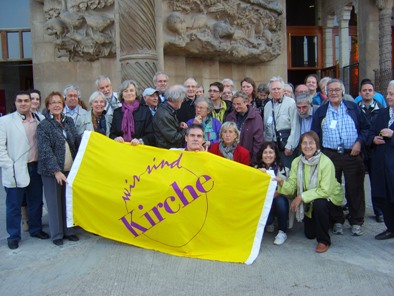“Year of faith” should be “year of dialogue”, say Catholic Reform networks

ROME -- The World-Wide Catholic Reform Networks celebrated the 50th anniversary of the second Vatican Council by calling for dialogue between the Catholic Church and the people.
The networks, represented by the International Movement We Are Church (IMWAC) and the European Network Church On The Move, call for reform in the Catholic Church. They base themselves on the outcome of the second Vatican Council, which aimed to reform liturgy and increase the pastoral care of Bishops.
Ahead of the beginning of the “year of the faith”, which will be announced by the pope on the 11th of October, Christian Weisner, Co-initiator of the Church referendum We are Church, called for the year to be instead a “year of dialogue between the people and the Church. The Church needs to know what the people want.”
Bringing the ideas of a reformed Church to Italy is not easy, Weisner said: “The reformed Church gives a less pretty image of the Church, it can’t rival St Peter’s. But the Church should question why so many people are leaving the Catholic Church, and migrating towards Evangelical churches,” a trend which he added is not confined to Germany or Europe, but has spread all over the world. Weisner mentioned Latin America as a particular example.
“People want to belong to a Christian community but don’t recognise the Catholic Church as the place they want to belong to,” he said.
Dr. Martha Heizer, co-founder of the Church referendum We are Church in Austria, outlined the wishes of IMWAC: “We want a collegial and democratic Church; pluralism and dialogue within the Church; gender equality and the acceptance of diverse sexual orientations; the ordination of women and married people for the service of the People of God (but not to enhance a new clericalism), and a separation between religion and state.”
When asked whether these requests weren’t more in line with the Protestant Church, Heizer replied, “in structure perhaps, but not in content. I am definitely a Catholic. I love the content of the Catholic Church, I’m glad of the instrument that is the pope, I would not like to be a protestant.”
The press conference, held in Rome and just minutes from Vatican City, took place on the third day of the 13th Synod of Bishops, which assembles a large part of the Catholic hierarchy. The Vatican and IMWAC do not always see eye to eye: “we support as well as critic the Vatican,” said Heizer.
Vittorio Bellavite, spokesperson for “Noi siamo Chiesa” (the Italian branch of IMWAC), declared that “Noi Siamo Chiesa is very sceptical about the chances of the just launched Synod to say something relevant about evangelisation.” His faith lies instead in the possibilities opened by the Catholic Reform networks he is a part of.
IMWAC was founded in Rome in 1996. It is an international movement within the Roman Catholic Church and aims at renewal on the basis of the Second Vatican Council (1962-1965).
The European Network Church On The Move was founded in 1990. It is working for reform of the Roman-Catholic Church.


